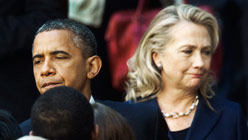We discuss the killing of the U.S. ambassador to Libya and three other Americans by armed protesters at a demonstration over an anti-Muslim video.
On Chris Stevens' Character
We worked together briefly when he was at the consulate in Jerusalem. And I think above all, above anything that's been said this morning — a terrific man, an outstanding diplomat, and a profound loss.
–Aaron David Miller
Not to overstate it, Chris Stevens was a very close friend of mine in law school and that was more than 20 years ago. We kept in touch thereafter for a few years, but then we lost touch. But I just wanted to offer, sort of go from the political to the personal, and say this was a guy who was just an enormously decent human being, who left the world of corporate law to do what he considered to be good in the world. [He] was more value driven than almost anyone I've ever met. I just think it's an enormous loss for our community and for the nation. This was just an enormously decent human being.
–Caller, Dylan from Berkeley
On Anti-Americanism in a Post Arab-Spring World
I do believe, even before the Arab spring, there was a rising current of anti-American sentiment in the region. Our policies are profoundly disliked and when the authoritarians, the adversarial and acquiescing authoritarians, who kept the lid on were forced from power, public opinion and public sentiment [began to play] a much greater role in shaping the political climate. It is no coincident that, it would strain the bounds of credulity to the breaking point to assume that this was some haphazard random event which had nothing to do with the anniversary of 9/11.
–Aaron David Miller
I think these new regimes, have not yet demonstrated a capacity, to maintain the kind of [needed] security, whether it's an inability or it's an unwillingness. The governments of Libya and Eqypt need to be told in no uncertain terms by our government that a condition for cooperation, forget economic reform, forget the relationship with Israel for now, but they need to be told in unmistakable terms, as a condition of continued cooperation and assistance from the United States of America that they are responsible for the safety and security of American citizens and American diplomats.
— Aaron David Miller
On the Middle-East's Misunderstanding of Freedom of Speech
There's another issue which to me is deeply troubling and extremely controversial and that is the conflation that exists in the minds of too many Islamists that the West is somehow responsible, the West, the United States, America, Denmark, for the efforts of individuals, who in a climate of freedom of conscious and freedom of expression essentially, at least in this society, in this system, have the right to express their views. And I think it's not the grievances that are so alarming. I'm not a religious man, but I would be aggrieved too if some of the images that you yourself conveyed that this filmmaker conveyed in his film, assaulted and insulted my religion, it is crossing the line from grievance to violence
— Aaron David Miller
President Morsi's spokesman came out and said that President Obama should prosecute the makers of this despicable film. There's not really a conception of how [free speech] works. And I think that's something that's going to be a problem going forward in the US/Egypt relations as well.
–Janine Zacharia
